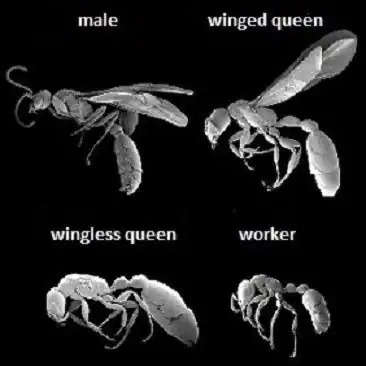
In the Quran worker ants do not have any wings and are all females. Skeptics claim that whoever wrote the Quran made a mistake; worker ants are both males and females. Today scientists confirm that worker ants do not have any wings and are all females.

Most male ants have wings; but wingless males do not forage outside their nests.
Journal Of Hymenoptera Research, Ergatomorph wingless males in Technomyrmex vitiensis Mann, 2016.
"Wingless males do not participate in the taking care of the brood and active foraging outside the nest". Hence all wingless ants foraging outside the nests are strictly females. This was only known recently, however this was portrayed in the Quran 1400 years before it was discovered. The Quran addressed ants that cannot fly in the female mode:
Until, when they came upon the valley of the ants, an ant said, "O ants, enter your homes so that you do not be crushed by Solomon and his soldiers while they do not feel it."
١٨ حَتَّىٰ إِذَا أَتَوْا عَلَىٰ وَادِ النَّمْلِ قَالَتْ نَمْلَةٌ يَا أَيُّهَا النَّمْلُ ادْخُلُوا مَسَاكِنَكُمْ لَا يَحْطِمَنَّكُمْ سُلَيْمَانُ وَجُنُودُهُ وَهُمْ لَا يَشْعُرُونَ
For the word "said": Kala (قال) is for males. Kalat ( قَالَتْ) is for females. The Quran used Kalat قَالَتْ (female).
If this ant had wings it would have flown off however it didn't have this option; instead its only option was to hide underground. Since it didn't have wings then this was definitely a female ant. Here the Quran correctly addressed this ant in the female mode.
Free AI Website Maker